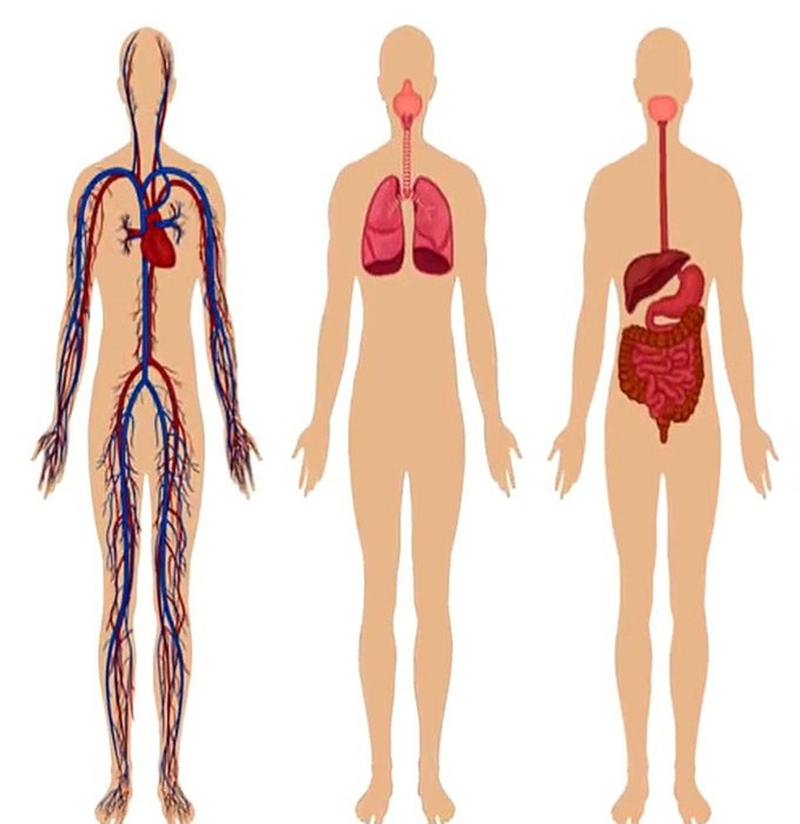The human body is designed to function in a manner that every part works cooperatively. In fact, no organ or body system is superior over the others, and each system just supports one another to keep you healthy. Circulatory system, respiratory system, digestive system, excretory system, immune system…so many systems are there and you may be wondering how they work together. Well, how the digestive, respiratory, and circulatory work together will be mainly discussed here to help understand your body better.

How Do the Digestive, Respiratory and Circulatory Work Together?
Digestive and Respiratory Systems
Your digestive system is responsible for breaking down food to allow your body to absorb the nutrients from what you ate. During the process of digestion, your body breaks down nutrient molecules, which will then be absorbed by your intestines then into the bloodstream. These molecules will not only help in building new ones but also provide you the energy you need to function.
On the other hand, your respiratory system is responsible for taking in and circulating oxygen into your bloodstream and to the rest of your cells. Circulatory system is also responsible for picking up carbon dioxide waste and helps you exhale these wastes.
How are these two systems related?
Your digestive tract needs smooth muscles to break down food into liquid and for better contractions to help move them throughout your system. Oxygen helps maintain the smoothness of muscles and to make sure that your digestive tract is in tiptop condition.
Consequently, your respiratory system cannot function well without the nutrients broken down by your digestive system. You use respiratory muscles including intercostal muscles and diaphragm to inhale. These muscles need nutrients in the form of fat and carbohydrates to contract and allow you to breathe properly.
In other words, your digestive system metabolizes food to provide your body with nutrients and at the same time, fuel your respiratory system so that it can produce enough oxygen in your body. This keeps you energized too.
Respiratory and Circulatory Systems
Now you know how your body’s ability to digest food helps you breathe properly. That's just part of answer to question "How do the digestive, respiratory and circulatory work together". Here’s the next question: how does the breathing process affect your circulatory system?
First, you need to understand the difference between the two.
Keep in mind that the circular system is composed of your heart and blood vessels, which are also divided into veins, arteries, and capillaries. The primary role of the heart is to pump blood throughout your blood vessels. In return, the blood vessels, which are divided into four chambers, move highly oxygenated blood into your body through your arteries. This oxygenated blood is responsible for supplying your body’s tissues with oxygen.
As to your respiratory system, this system is composed of airways, your lungs, and other structures that move air in and out of your lungs. Breathing starts with your nose or mouth and then goes down to through you throat then head straight to the bronchi. Apart from this mechanism, your respiratory system also uses muscles, specifically intercostal muscles between your ribs, causing your lungs to contract and expand.
How are the two systems related?
In fact, your circular and respiratory systems work for the same goal: to provide oxygen to your tissues and get rid of carbon dioxide in your body.
The respiratory system supplies oxygen to your blood and help remove carbon dioxide. Every time your heart receives low oxygen blood, it starts to pump to the lungs through pulmonary arteries. As a result, your lungs expand to get fresh air, thereby transferring oxygen into low oxygenated blood. This gives your blood fresh oxygen once again, which then returns to your heart, and your heart will pump again.
Digestive and Circulatory Systems
For the question "How do the digestive, respiratory and circulatory work together", here is the last relationship needed to be discussed.
The primary role of digestive system is to break down the food you ate and absorb all the nutrients your body needs to function properly as mentioned above. On the other hand, your cardiovascular system moves oxygen and other important compounds throughout your body.
How are the two systems related?
When it comes to digestive and circulatory systems, they both process and transport essential nutrients your cells need to fuel your body.
After you eat, your digestive system breaks carbohydrates into simple sugars like glucose. The bloodstream absorbs glucose, which your circulatory system distributes throughout the body. This provides your body enough energy then.
That’s not all. When it comes to fats digested, the circulatory system carries them all over your body to make them available. The fats will be converted into energy, which can help you last longer during workouts. When combined with the right kind of carbohydrates, this could power your muscles as well.
Protein, another food sources broken down by your digestive tract, helps in maintaining your cells and tissues’ health. The digestive system breaks them down into amino acids, which cells and tissues use to make new and healthy cellular proteins. This will be used for energy to help you get through the day, especially if you are not getting enough calories, fats, and carbohydrates.
The next time someone asks you, “how do the digestive, respiratory and circulatory work together?” you know the answer. And now you know the human body works in amazing ways that keep every system related and supportive of each other. In fact, one system cannot exist alone, as evidenced by the relationship among digestive, circulatory, and respiratory systems.
View All Comments /Add Comment